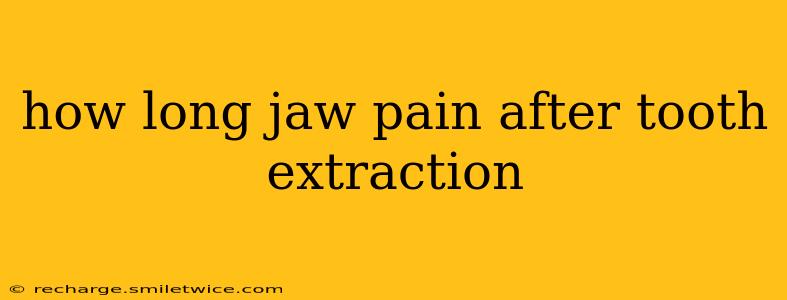The dreaded post-extraction jaw pain. It's a common experience, but the duration varies significantly depending on several factors. This comprehensive guide explores the typical timeline, potential causes, and what you can do to manage discomfort. Understanding this can ease anxiety and help you prepare for your recovery.
How Long is Normal for Jaw Pain After a Tooth Extraction?
Generally, you can expect some level of jaw pain and discomfort for a few days to a week after a tooth extraction. This initial pain is often most intense in the first 24-48 hours, gradually diminishing as healing progresses. However, mild discomfort might linger for up to two weeks. Anything beyond that should prompt a follow-up with your dentist.
What Causes Jaw Pain After Tooth Extraction?
Several factors contribute to post-extraction jaw pain:
- Inflammation: The extraction site is essentially a wound, and inflammation is a normal part of the healing process. This swelling can put pressure on surrounding tissues and nerves, causing pain that radiates to the jaw.
- Nerve Irritation: The extraction process can sometimes irritate nearby nerves, leading to pain, tingling, or numbness in the jaw. This usually resolves as the area heals.
- Dry Socket: A dreaded complication, a dry socket occurs when the blood clot protecting the extraction site dislodges. This exposes the underlying bone and nerves, resulting in severe, throbbing pain that can radiate to the jaw. It typically develops 3-5 days post-extraction.
- Sinus Involvement: Extractions in the upper jaw can sometimes affect the maxillary sinus, causing referred pain to the jaw and cheek.
- Muscle Strain: The jaw muscles might get strained during the procedure or due to clenching or grinding your teeth during recovery.
How Can I Relieve Jaw Pain After Tooth Extraction?
Managing jaw pain is crucial for comfortable recovery. Here's what you can do:
- Follow your dentist's instructions carefully: This includes prescribed medication, rinsing instructions, and dietary recommendations.
- Over-the-counter pain relievers: Ibuprofen or acetaminophen can effectively manage pain and inflammation. Always follow the recommended dosage.
- Ice packs: Applying ice packs to the affected area for 15-20 minutes at a time, several times a day, can reduce swelling and pain.
- Rest: Avoid strenuous activities and get plenty of rest to allow your body to heal.
- Soft foods: Stick to a soft food diet to avoid irritating the extraction site.
- Avoid smoking and alcohol: These can hinder healing and increase the risk of complications like dry socket.
What If My Jaw Pain is Severe or Persistent?
If your jaw pain is:
- Intense and doesn't respond to over-the-counter pain relievers
- Accompanied by fever, excessive swelling, or bleeding
- Persistent beyond two weeks
- Radiating to other parts of your face
Contact your dentist immediately. These could be signs of a serious complication like dry socket or infection.
Is Jaw Pain After Tooth Extraction a Sign of Dry Socket?
Jaw pain, especially intense throbbing pain starting a few days after the extraction, can be a sign of dry socket. However, dry socket is characterized by:
- Severe, localized pain
- Visible empty socket (your dentist can confirm this)
- Bad odor or taste
Don't self-diagnose. Contact your dentist for proper evaluation if you suspect a dry socket.
How Long Does It Take for the Jaw to Fully Heal After Tooth Extraction?
While the immediate pain and swelling subside within a couple of weeks, complete healing can take several months. Bone regeneration and tissue repair are gradual processes. You might notice some lingering tenderness or sensitivity for a longer period.
When Should I See My Dentist After Tooth Extraction?
Follow up with your dentist for a post-operative check-up as scheduled. This allows them to monitor the healing process and address any concerns.
Remember, this information is for general knowledge and doesn't replace professional medical advice. Always consult with your dentist or oral surgeon for personalized guidance regarding your specific situation. They can provide the best assessment and treatment plan for your post-extraction recovery.
